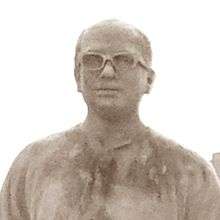Syed Nazrul Islam
Syed Nazrul Islam (Bengali: সৈয়দ নজরুল ইসলাম Soiod Nozrul Islam) (1925 – 3 November 1975) was a Bangladeshi politician and a senior leader of the Awami League. During the Bangladesh Liberation War, he was declared as the Vice President of Bangladesh by the Provisional Government. He served as the Acting President in the absence of Sheikh Mujibur Rahman.[1]
Syed Nazrul Islam | |
|---|---|
সৈয়দ নজরুল ইসলাম | |
 | |
| 2nd Minister of Industries of Bangladesh | |
| In office 13 January 1972 – 26 January 1975 | |
| President | Abu Sayeed Chowdhury Sheikh Mujibur Rahman |
| Prime Minister | Sheikh Mujibur Rahman |
| Preceded by | Muhammad Mansur Ali |
| Succeeded by | Abul Hasnat Muhammad Qamaruzzaman |
| 1st Vice President of Bangladesh | |
| In office 17 April 1971 – 12 January 1972 | |
| President | Sheikh Mujibur Rahman |
| Prime Minister | Tajuddin Ahmad |
| Preceded by | Post created |
| In office 25 January 1975 – 15 August 1975 | |
| President | Sheikh Mujibur Rahman |
| Prime Minister | Muhammad Mansur Ali |
| Succeeded by | Revived in 1977 with Justice Abdus Sattar |
| Personal details | |
| Born | 1925 Kishoreganj, Bengal Presidency, British India (now in Bangladesh) |
| Died | 3 November 1975 (aged 49–50) Dhaka, Bangladesh |
| Political party | Bangladesh Krishak Sramik Awami League (1975) |
| Other political affiliations | All-India Muslim League (Before 1949) Awami League (1949–1975) |
| Children | Syed Ashraful Islam, Syeda Zakia Noor Lipi,Syed Monzorul Islam,Syed Shoriful Islam, Syed Shafayet Islam,Syeda Rafia Noor. |
| Alma mater | University of Dhaka |
Early life
Syed Nazrul Islam was born in 1925 at Jashodal Dampara in the Kishoreganj District (then Mymensingh District) of the province of Bengal.[2] He obtained degrees in history and law from the University of Dhaka and was an active student political leader in the Muslim League. Syed captained his college's cricket and hockey teams and participated in the Pakistan movement. He entered the civil service of Pakistan in 1949 but resigned in 1951 to work as a professor of history at the Anandmohan College in Mymensingh, where he also practised law.[3]
Political career
Syed Nazrul's political career began when he joined the Awami Muslim League and participated in the Language Movement in 1952, for which he was arrested by Pakistani police. He would rise to various provincial and central party leadership positions, becoming a close confidante of the party's leader Sheikh Mujib. He was jailed during the Six Point Demand movement.[4] He was elected to the National Assembly of Pakistan in 1970, where he served briefly as deputy leader of the majority. Following the arrest of Mujib on 25 March 1971 by Pakistani forces, Syed escaped to Mujibnagar with other party leaders and proclaimed the independence of Bangladesh.[5] Mujib was elected president of Bangladesh but Syed would serve as acting president, with Tajuddin Ahmed as prime minister. Syed played a key role in leading the nationalist cause, co-ordinating the Mukti Bahini guerrilla force and winning support from India and other nations.[3]
After the independence of Bangladesh, Syed was appointed minister of industries, the deputy leader in parliament and a member of the constitution committee. When Mujib banned other political parties and assumed sweeping powers as president in 1975, Syed was appointed vice-Chairman of the BAKSAL, the renamed Awami League.[3]
Death
Following the assassination of Sheikh Mujibur Rahman on 15 August 1975 Syed fled underground with other Mujib loyalists such as Tajuddin Ahmad, A. H. M. Qamaruzzaman and Muhammad Mansur Ali, but was ultimately arrested by the regime of the new president Khondaker Mostaq Ahmad. The four leaders were imprisoned in the Dhaka Central Jail and assassinated on 3 November under controversial and mysterious circumstances. This day is commemorated every year in Bangladesh Jail Killing Day.[6] Captain (relieved) Kismat Hashem was sentenced to life in prison for the killings. He died due to cardiac arrest in Canada.[7]
Legacy
Government-run Shahid Syed Nazrul Islam Medical College in Kishoreganj is named in his memory.[8] Sayed Ashraful Islam is son of Sayed Nazrul Islam.[9]
References
- "Documents between India and Bangladesh". The Daily Star. Retrieved 21 June 2015.
- "Remembering the Four Leaders". The Daily Star. Retrieved 21 June 2015.
- "Islam, Syed Nazrul". Banglapedia. Retrieved 14 April 2016.
- Ahsan, Syed Badrul. "Recalling Six Points". The Daily Star. Retrieved 21 June 2015.
- Palma, Porimol. "On the road to freedom of Bangladesh". The Daily Star. Retrieved 21 June 2015.
- "Remembering the four national leaders on Jail Killing Day". bdnews24.com. Retrieved 21 June 2015.
- "Jail killing convict Kismat Hashem dies in Canada". The Daily Star. Retrieved 21 June 2015.
- "Medical college after Syed Nazrul Islam to be set up at Kishoreganj". The Financial Express. Dhaka. Retrieved 21 June 2015.
- "Sheikh Hasina fires trusted Syed Ashraful as LGRD minister". bdnews24.com. Retrieved 14 April 2016.
| Political offices | ||
|---|---|---|
| Preceded by Mujibur Rahman |
President of Bangladesh Acting 1971–1972 |
Succeeded by Abu Sayeed Chowdhury |
| Preceded by none |
Vice President of Bangladesh 1971–1972 |
Succeeded by Abdus Sattar |
